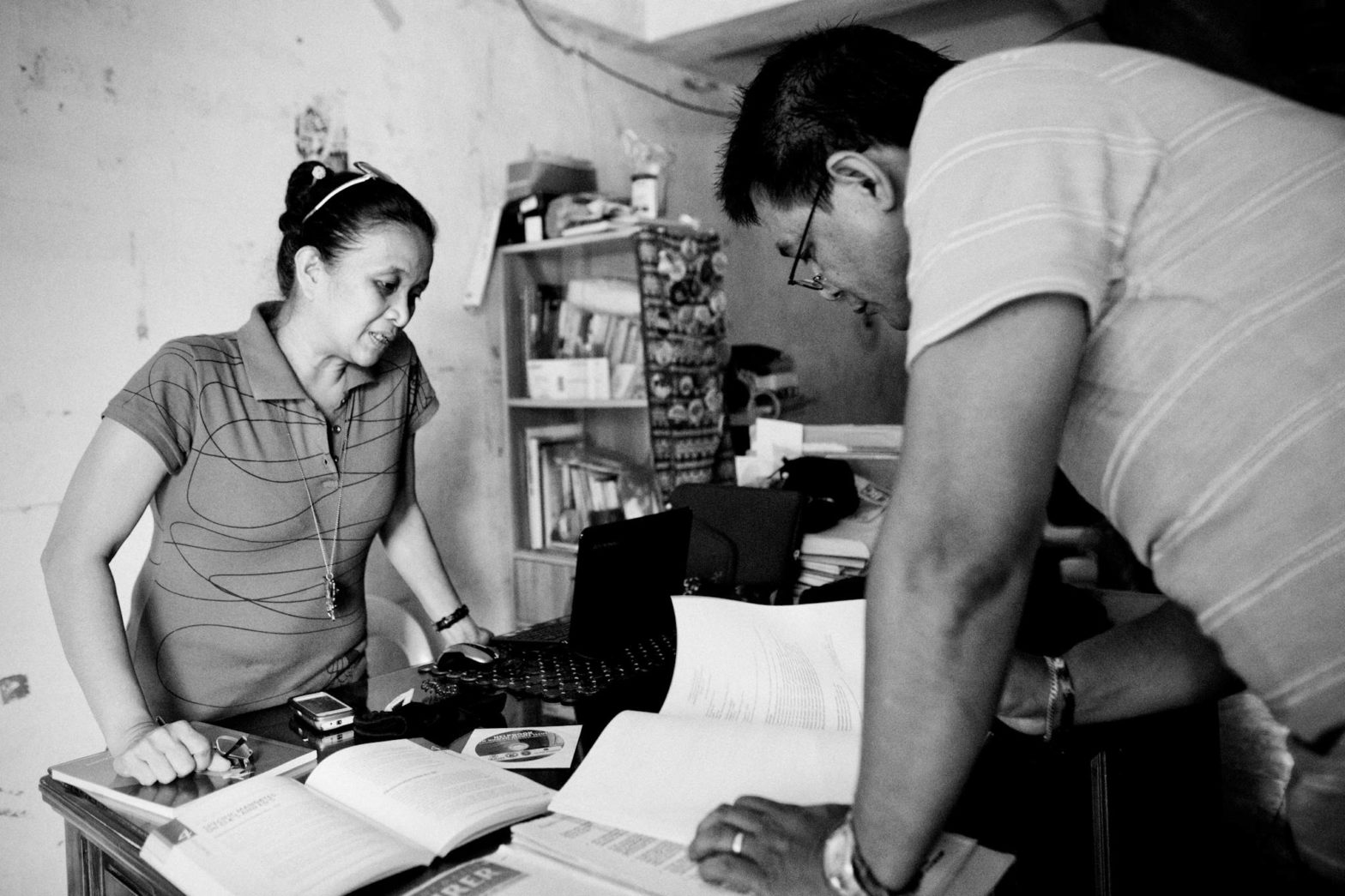By MEDIA SOLUTIONS

LEGASPI CITY — Barely three months after activist Methodist pastor Isaias Sta. Rosa was abducted and gunned down in August 2006, supertyphoon “Reming” battered Albay province, burying his home in Barangay Malobago, Daraga town in lahar and leaving his widow Sonia and four children homeless.
Despite having to start over at a government relocation site about 20 kilometers away from their old home, Sonia at the time doggedly sought justice for her husband through the criminal justice system. She divided her attention between her children—one of them a special child—and building a strong case against his assailants.
For years, the embittered Sonia was convinced the case would end up nowhere. After the hard work she put in, the complaint against two officers and several personnel of the Army’s 9th Military Intelligence Battalion was dismissed by the Prosecutor’s Office in 2007—twice.
But in a recent interview with VERA Files Sonia said she is now open to the idea of reviving the case.
She is still wary, though, of the Criminal Investigation and Detection Group, whom she accuses of bungling the initial investigation along with the Department of Justice, and said she would let the human rights group Karapatan take the lead.
To be actively involved in the reinvestigation, she said, would only bring back the pain and bad memories, besides the possibility that this might yet again endanger her family.
The widow said Karapatan’s lawyers recently contacted her to say they will be filing a writ with the court to compel the Armed Forces of the Philippines to produce documents that could help identify the other soldiers who allegedly abducted Sta. Rosa.
One of the soldiers, later identified as Pvt. Lordger Pastrana of the 9th Infantry Division, was found dead together with Pastor Sta. Rosa meters away from the victim’s residence.
The CIDG filed a case of murder against Maj. Ernest Marc Rosal, who was said to have issued Pastrana’s mission order, and Capt. Arnaldo Manjares, who owned the gun recovered from Pastrana’s body. But these cases have not progressed, eventually ending up in a cold trail.
Told in a previous interview with VERA Files that the DOJ and the CIDG, under orders to revisit “cold” cases of extrajudicial killings, were just waiting for someone to move for the reopening of her husband’s case, Sonia retorted then, “What for?”
“I would not allow myself to be part of the government’s charade in its effort to cover up its ineptness in giving justice to the countless victims of human rights victims in the country,” she said.
State inefficiency
In that same interview conducted during her lunch break from the nongovernmental Bicol Center for Community Development (BCCD) in downtown Daraga, Sonia recalled how the DOJ failed to give her and other witnesses a chance to fully narrate their stories that would have supported the pieces of evidence submitted along with the complaint.
“If only the prosecutors allowed us to speak before them,” she said. “But they were too fast in dismissing the complaint. It only reinforced our belief that there was a concerted effort to hide the truth from us and deny us justice.”
The first complaint filed by the CIDG on May 25, 2007 against Rosal and Manjares was dismissed by the Albay Provincial Prosecutor’s Office on June 8, 2007. The second complaint filed on Oct. 8 that year was dismissed by the DOJ’s regional Task Force on Human Rights Violations and Extra Judicial Killings a few months later.
Sonia also then expressed fear that reviving the case would again subject her and her family to harassment, as what they experienced after the killing. “We reported those incidents of harassment to the police, but they never acted on it,” she said.
‘Glaring’ evidence disregarded
John Concepcion, spokesman of the human rights alliance Karapatan in Bikol, said no one could blame Sonia for her initial reluctance.
He said the policemen and government lawyers who investigated the case disregarded “glaring” pieces of evidence that linked the military to the killing, forcing Karapatan to bring Sta. Rosa’s case and other cases of extrajudicial killings before the international forum.
The action paved the way for the visit to the Bicol region of United Nations Rapporteur Philip Alston, who concluded that the killings of members of progressive organizations were carried out or abetted by government agents.
Concepcion said Sta. Rosa’s case may still prosper if only the government investigators would compel the military to reveal the accomplices of Pastrana who attacked Sta. Rosa on the evening of Aug. 3, 2006.
Police found Pastrana dead beside Sta. Rosa in a creek and recovered from his body a .45-cal. gun and his wallet that contained a mission order.
Concepcion said one of the keys to the resolution of the case is Rosal, then the head of the 9th Military Intelligence Battalion under the Army’s 9th Infantry Division based in Camp Weene Martillana, Pili, Camarines Sur, who issued Pastrana the mission order.
The military tried to make it appear that Pastrana was also a victim and the main culprit was the New People’s Army.
The Karapatan spokesperson said, however, witnesses had tagged Pastrana as the one giving commands when they ransacked Sta. Rosa’s house.
He said the military also tried to mislead the investigators by making it appear that Pastrana had long been reassigned to other units before the incident and that he was only at the vicinity visiting his girlfriend at the time of the killing.
Concepcion said investigators failed to pursue these leads, which could have proved the military’s attempts to cover its tracks.
New CIDG probe team
Senior Supt. Eduardo Diocos, now head of the CIDG in Bicol, acknowledged the improper investigation done by previous investigators who, he said, were overly eager to rush the filing of the case because of the pressure put on them.
“If you rush the filing of the case just to beat a deadline because you are under pressure, the tendency really is that it will be dismissed,” he said.
Diocos said he will soon form a team to look into the Sta. Rosa case, which will start from square one, including profiling the victim to establish possible motives of his killing.
This time, he said, the CIDG will not rush the investigation to ensure that no angle is overlooked and a strong case will be filed against the perpetrators.
“I want to look all possible angles—affiliations, job, personal background—and then do a process of elimination,” Diocos said.
Diocos stressed that Pastrana is still considered a victim as he was also gunned down that night. “What we have here is a double murder case,” he said.
Diocos said coordination with the Army will all be done in writing. Should the Army refuse to cooperate, including turn over documents needed by the CIDG, this will form part of the evidences that will be submitted to the court.
“Refusal to cooperate is a sign of bad faith,” he said.
In the meantime, the CIDG regional chief said he is willing to sit down with human rights group Karapatan to compare notes, and will also coordinate with the Army’s 9th Infantry Division on Pastrana’s and the unit’s reported involvement in the slaying.
Diocos said he is looking for a break in their tight schedule to jumpstart the reinvestigation as CIDG is swamped by cases for immediate investigation, the latest of which was the killing of a media man in Iriga City.
The CIDG head said they are saddled with shortage in logistics and personnel. The agency gets only P20,000 a month for its operations in six provinces, or an average of P111 per day.
Normal life
These days, Sonia prefers not to dwell much on the case, saying it not only brings back the pain but also the anger at not getting justice for her husband. “I don’t want to rekindle the pain that tragic incident brought to me and my kids,” she said.
The pastor’s widow said she is trying to live a normal life despite the hardships they are suffering as a result of her husband’s death.
“I am not only a mother to my kids, but I’m also now the father to them,” she said.
Sonia works beyond regular office hours and even on weekends to do field work as development worker of the BCCD, just to be able to support her family. She laments she hardly has time to bond with her children, two daughters and two sons, including a special child.
Following her husband’s death, she was forced to stop sending her special child to school as she could not support his needs, she said.
Although justice might not have come for her family, Sonia believes her husband did not die in vain. He died serving the people, she said.
(This story is part of the VERA Files project “Human Rights Case Watch” supported by The Asia Foundation and the United States Agency for International Development.)

